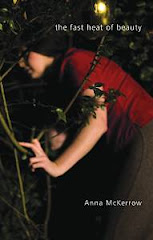Just found this review of Spectral Emphatic online at Stride Magazine from a reviewer that obviously HATED it. However, in the interests of parity and fairness, I include it here, complete with mis-spellings and grammatical errors :)
Anna Mckerrow's second poetry collection is entitled Spectral Emphatic promises so much in its premise and yet delivers very little. The title poem of this collection contains everything which I find frustrating about the collection, the expectation of narrative which is only ever partly fulfilled, the clichéd imagery and a purposeful obscurity in its language. Mckerrow's language is too often over the top unfortunately, using religious and spiritual images which are not concrete enough to really allow her voice to come through. Therefore the reader gets lost in the abstractions and fails to understand what she is actually trying to say. This quotation from the title poem Spectral Emphatic portrays this:
They roost among its evangelical exhortations for spiritual revolution.
Good poetry is based upon subtlety, precision of language and showing the reader, rather than telling the reader everything, essentially trusting the reader. 'Spectral Emphatic' fails on all three points. The poetry is often didactic, clichéd and her obvious love of language could be used so much better, if concrete images were used. After saying all this, Mckerrow's best poem in this collection comes right at the end of the book, 'A Bibliomantic poem', because it makes an attempt to do all these things, with one of the better lines being:
Without truly understanding her own, motives, the writer
photocopied page 8 of every book on the tree-shelf bookshelf
in her study.
Although I usually have an aversion to meta-poetry, poetry about writing poetry, unless it is done especially well with flair (I still have my reservations) but this poem is adequate in its attempt to tackle the subject. She approaches it well, using definite language, in an almost prose poem style to end up with a poem that is funny and insightful. However this poem is far from perfect, McKerrow slips into abstractions, using adverbs like 'yearning' to try and sound more poetic when a more concrete word would be better. Unfortunately after reading this collection several times I couldn't find much I liked about it. It lacks the clarity and precision of language which is necessary to create good poetry.
---------------------------------------------
Interestingly, the line he quotes above as being a great line of poetry is (weirdly) not even part of the poem itself and is instead part of the explanatory text that precedes it: it should also read "three-shelf" rather than the intriguingly misquoted "tree-shelf" and not have a comma after "own". Nitpicking.
As to the gist of the review, I entirely take on the point that someone looking for an obvious narrative in the poems will be disappointed in many of them. I dislike too much narrative in poetry on the whole: I like it best when it's unconscious, image-rich and slippery, with images auggesting moods and elision rather than wholeness. Dreamlike, really. Purposeful obscurity, as observed. That's often what I'm after. And, actually, poems which were more narrative and had more of a sense of internal unity wouldn't, in my view, make sense within the remit of Spectral Emphatic, which is by definition a "channelled" work - prone to inaccuracy, strangeness, wisps and passing influences. Dreams ARE obscure. Who can fully explain David Lynch's Mulholland Drive??
I personally dislike poetry which is too "clear" and "simple", preferring verbally complicated or bulbous things, so it makes total sense to me that if this is what you like, you won't like Spectral Emphatic. HOWEVER, it's a terrible shame to be a cliche. I shall have to make a mental note to avoid being so in the future when creating unusual conceptual works :)
Oh, and I am DELIGHTED to be found to slip into abstractions.
Tuesday, 31 May 2011
Subscribe to:
Comments (Atom)





